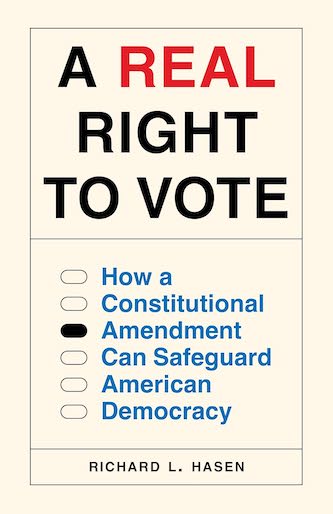Author Interview: Richard L. Hasen on “The Real Right to Vote”
By Blake Maddux
“We have much less protection over our right to vote than most people think.”
 The next time that you’re perusing the U.S. Constitution, look carefully — in the original test and the amendments — for the passage that reads, “All native born or naturalized American citizens are, by that virtue, guaranteed the right to vote in local, state, and national elections.”
The next time that you’re perusing the U.S. Constitution, look carefully — in the original test and the amendments — for the passage that reads, “All native born or naturalized American citizens are, by that virtue, guaranteed the right to vote in local, state, and national elections.”
Actually, I will save you the time. It doesn’t say that. Anywhere.
That’s right. Despite what many (if not most) residents of the 50 states believe, the right to vote is not a constitutionally guaranteed one.
Granted, there are amendments that prevent people from being denied the right for specific reasons, e.g., the 15th, the 19th, and the 26th.
However, this does not mean that no non-Caucasian person, woman, or person of at least 18 years of age cannot be prevented from casting a ballot without running afoul of the nation’s governing document. In fact, it happens for a myriad number of reasons, including lack of required or up-to-date identification, convicted felon or former prisoner status, and living as a student in somewhere other than one’s permanent address.
These hurdles often end up disenfranchising or burdening Black people, Indigenous Peoples, females, younger eligible voters, and transgender individuals. Several of these groups are among the ones whom the aforementioned amendments were (theoretically) meant to protect.
UCLA law professor, Election Law Blog, and Safeguarding Democracy Project director Richard L. Hasen proposes a solution to this issue in his new book, A Real Right to Vote: How a Constitutional Amendment Can Safeguard American Democracy (Princeton University Press).
He writes, “a constitutional right to vote would protect core voting rights while simultaneously dealing with some of the particular pathologies of the electoral system that have served to make the United States a laggard rather than a world leader on the question of democracy.”
Professor Hasen, who is also a frequent MSNBC contributor, answered the following questions for me via email.
The Arts Fuse: How do you respond when you hear people describe a right to vote as “fundamental,” “guaranteed,” “constitutional,” or one that is theirs “as an American”?
Richard Hasen: The sentiment is heartfelt but technically incorrect. We have much less protection over our right to vote than most people think. And much of the protection we have comes not from the text of the Constitution, but from some Supreme Court interpretations of the Constitution in the ’60s, in cases that could well be in danger before the current Supreme Court.

Author and UCLA law professor Richard Hasen. Photo: WikiCommon
AF: How long has the idea of the universal, positively affirmed, constitutional right to vote been kicking around and what is its current status?
RH: The first serious efforts toward universal voting came after the Civil War, in what eventually became the Fifteenth Amendment to the Constitution. The final version of the amendment bars only race discrimination in voting. This amendment, like most of the voting amendments, is framed in the negative: Guaranteeing no one in particular a right to vote, but barring some form of discrimination if there is an election.
AF: A constitutional amendment is difficult to pass even under ideal political circumstances. It is implausible in Trump-era America. How will the political climate have to change in order for this amendment to develop any traction?
RH: This is a long term project. Here, I look to the example of the Nineteenth Amendment, which bars discrimination in voting on the basis of sex. We can see what happened after the Supreme Court in 1874 rejected the effort of a woman to argue that the Constitution already protected her against gender discrimination. When that effort failed, the action moved to the states and toward the passage of a constitutional amendment. It took until 1920 to get that Nineteenth Amendment passed by Congress and ratified. But voting rights were strengthened all along the way. I hope the same thing would happen with a broader right to vote.
AF: You describe the Warren Court’s decisions on voting rights as “generous” and “capacious.” Did they still remain within the parameters of what the Constitution permits?
RH: There are different theories of constitutional interpretation. To me, the expansion of voting rights in this way was legitimate, but to many “originalists” and traditionalists on the current Supreme Court, this was not a proper exercise of judicial interpretation. The point is that these issues are contested. There are no neutral principles that can be applied without the use of judgment by the Justices, whether liberal or conservative.
AF: What might Democrats, who tend to support expanded voting rights, actually find objectionable about a constitutional right to vote?
RH: Some may not like some of the particulars in my proposal, such as my marrying of universal voter registration with all costs borne by the government via a national system of identifying voters. Others may think I don’t go far enough on issues like the Electoral College, voting for noncitizens, and other issues.
AF: Similarly, what might Republicans — many of whom seem to be certain, under the instructions of their party’s leader, that widespread voter fraud is undeniable — find appealing about it?
RH: My amendment makes fraud harder, makes keeping track of voters easier, cuts back on the amount of election litigation, makes it harder to subvert election outcomes, and makes voting easier. Especially with the Republican Party seeking to attract more voters who are less educated and poorer, expanding voting rights could help the Party politically.
AF: When people turn 21 years of age, all they have to do is present a valid ID in order to be sold alcohol. Would the issuance of a unique voter identification number make voting similarly seamless? Would people be required to have a card with the number on it with them in order to vote?
RH: It would not be quite as seamless, but I imagine working with high schools as a first step. Get people pre-registered when they are in high school. That won’t cover everyone but it will cover a large majority of voters. No one would need to carry particular documents to vote. They could use their thumb print if they like or other ways of identifying themselves.
Blake Maddux is a freelance journalist who regularly contributes to the Arts Fuse, Somerville Times, and Beverly Citizen. He has also written for DigBoston, the ARTery, Lynn Happens, the Providence Journal, The Onion’s A.V. Club, and the Columbus Dispatch. A native Ohioan, he moved to Boston in 2002 and currently lives with his wife and six-year-old twins — Elliot Samuel and Xander Jackson — in Salem, MA.
